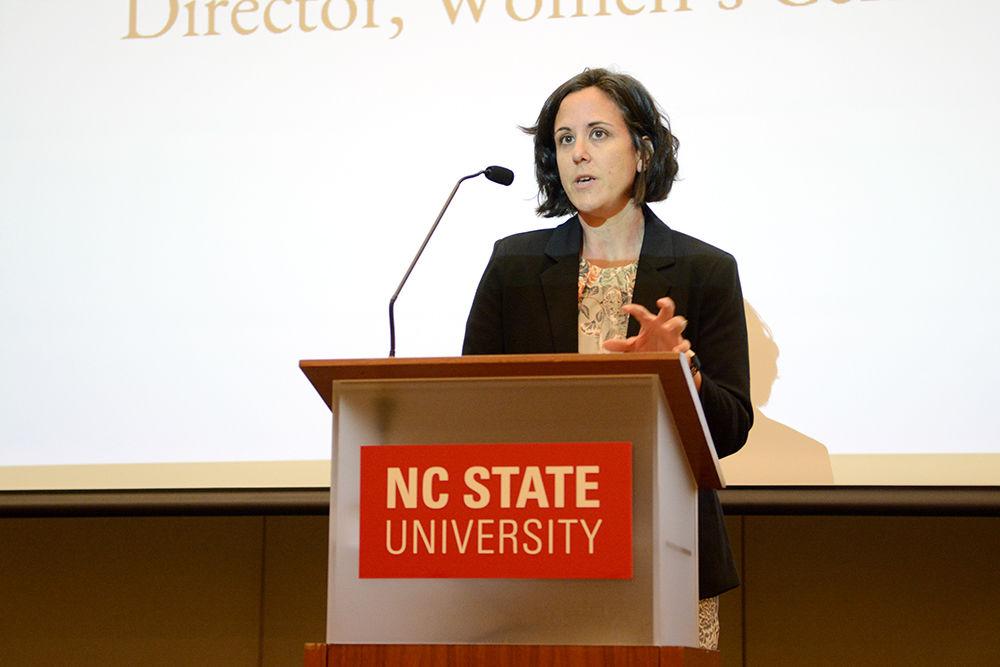 Lisa LaBarbera-Mascote, the director of the Women's Center, talks about the resources available on campus for students of all genders during the Sexual Assault Town Hall on Tuesday. The event was a part of the "It’s On Us" college sexual assault awareness campaign, which has been a part of two thousand campus events so far." />
Lisa LaBarbera-Mascote, the director of the Women's Center, talks about the resources available on campus for students of all genders during the Sexual Assault Town Hall on Tuesday. The event was a part of the "It’s On Us" college sexual assault awareness campaign, which has been a part of two thousand campus events so far." />
Sindy Huang
Lisa LaBarbera-Mascote, the director of the Women's Center, talks about the resources available on campus for students of all genders during the Sexual Assault Town Hall on Tuesday. The event was a part of the "It’s On Us" college sexual assault awareness campaign, which has been a part of two thousand campus events so far.
On Tuesday, Student Government hosted the Sexual Assault Education Town Hall, an event part of the It’s On Us week of action. Panelists spoke about sexual assault on campus to an audience in Talley’s Piedmont Ballroom.
The panelists discussed how NC State was working to address sexual assault, as well as resources available to students. They also gave time for the audience to ask questions and have their voices heard.
Amy Butler, a second-year studying engineering and a campus representative for the It’s On Us campaign, shared a personal story of the first time she encountered someone who had been sexually assaulted.
“Last semester, someone I knew at State told me that they had been assaulted on campus, and before then I knew the statistics,” Butler said. “I knew it happened, but it didn’t become real to me until she shared with me what had happened. Luckily I knew what to say then, and I knew to tell her that I believed her, and that I will stay by her. But it wasn’t until then that I said, okay, I need to get more involved.”
This led Butler to become involved with the It’s On Us Campaign, a national movement to end sexual assault.
Lisa LaBarbera-Mascote, the director of the Women’s Center, spoke about resources the Women’s Center provided to victims of sexual assault and shared statistics about sexual violence on campus.
“More than 90 percent of sexual assault victims on college campuses do not get reported as assault,” LaBarbera-Mascote said. “That same percentage also knew their perpetrator. College survivors are more likely to experience post-traumatic stress, depression, drug and alcohol abuse than survivors that are not in college.”
LaBarbera-Mascote explained why sexual assault on college campuses was often unreported.
“There are some really specific type of barriers that apply,” LaBarbera-Mascote said. “Students on college campuses choose not to report, oftentimes because they know their perpetrator. They don’t want to get that individual in trouble, they don’t want to cause issues, these are common things we hear. They could also be afraid of retaliation. Especially if that perpetrator is part of a friend group.”
Dave Johnson, the assistant equal opportunity officer at the Office for Institutional Equity and Diversity, explained the role Title IX played at NC State and how to report the incidents of sexual violence that occur on campus.
“There are a variety of ways to report,” Johnson said. “You could go to our website, you could go to the Women’s Center. Once you have reported, and it gets to our office, it is really up to the survivor what happens next. My job is to investigate and collect information about what happened and present that information to Student Conduct. What we do is to provide resources to those who are survivors.”
For more information about sexual assault or to seek counseling or help, visit the Women’s Center or the Counseling Center.